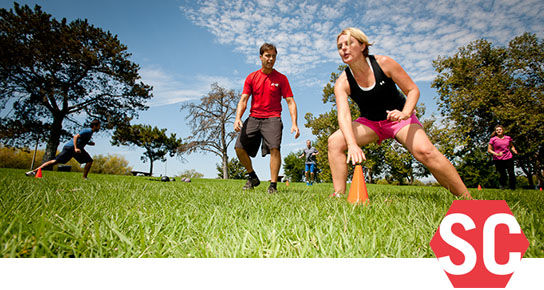
By Carrie Myers
From elite athletes to recreational athletes training for an event, there is a plethora of potential clients for certified sports conditioning specialists. In fact, 31 percent of American adults say they participate in at least one sport or physical activity—and that doesn’t even include the high school and college athletes.
“The wonderful thing about [working with] athletes is that they are so tuned into their own bodies, and their bodies respond very well to a training program,” says David Pasion, P.T., manager of Emory Physical Therapy Spine Clinic in Atlanta, Ga.
As a sports-conditioning specialist, you will work with athletes to help them perform at their highest possible level, as well as to help prevent injury. You may also work with clients post-injury, following physical therapy, to bring them back to a level of conditioning that allows them to compete again. Or you may work in conjunction with a physical therapist to keep the rest of the athlete’s body in shape while he or she is rehabilitating an injury.
“It is extremely satisfying and rewarding to be able to take a person recovering from an injury or surgery, and know that I’ve played a part in returning them to their prior level of play,” says Pasion.
According to Robert Forster, P.T., founder and CEO of Phase IV and Forster Physical Therapy in Santa Monica, Calif., there has never been a better time to become a specialist in the field of sports conditioning.
“Injury prevention and injury management are still unevenly practiced in organized sports at every level,” he says, “and it is an injustice because we have the science to help keep these warriors in the game.”
Part of this science is learning how an athlete’s body responds to training, and what type of training is most beneficial for his or her sport. In the ACE Sports Conditioning Specialty Certification, you’ll learn how to train athletes to boost power, speed, strength, agility, coordination and balance—all essential elements in almost every sport. And you will learn how to apply these principles to both personal-training clients, as well as group sports-conditioning and fitness classes.
Every year it seems there is at least one headline of an athlete dying or having serious complications as a result of dehydration or heat stroke. Therefore, courses on sports nutrition and thermoregulation and hydration are included to help ensure that none of your athletes end up as another sad statistic.
Whether your clientele is made up of elite and Olympic-level athletes, or your local weekend warriors and high-school competitors, athletes on both ends of the spectrum (and everywhere in between) need qualified specialists to help them meet their goals, perform optimally, and stay off the sidelines and in the game.
“It is as equally rewarding to work with elite athletes and Olympians on the cutting edge of maximizing human performance as it is helping people in our community work toward their health and fitness goals,” explains Forster. “Although the rewards of their efforts are divergent—the former seek excellence, fame and sometimes fortune, while the general public seeks to better their quality of life and satisfy their responsibilities to family and community—both deserve to be treated with compassion and with the best science available to achieve their goals.”
_______________________________________________________________________________
 Carrie Myers has a bachelor’s degree in exercise science and has been a freelance writer for more than 11 years. She is the author of the award-winning book, Squeezing Your Size 14 Self into a Size 6 World: A Real Woman's Guide to Food, Fitness, and Self-Acceptance and presents, teaches and trains in N.H. and Vt.
Carrie Myers has a bachelor’s degree in exercise science and has been a freelance writer for more than 11 years. She is the author of the award-winning book, Squeezing Your Size 14 Self into a Size 6 World: A Real Woman's Guide to Food, Fitness, and Self-Acceptance and presents, teaches and trains in N.H. and Vt.